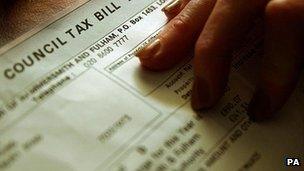Council tax increases despite government incentives
- Published
- comments

The government has asked councils to freeze local taxes for the third year running
More than 40% of councils in England are planning to increase council tax this year, according to a survey.
This is despite local authorities being offered money by the government to freeze bills.
However the Chartered Institute of Public Finance and Accountancy (Cipfa) survey suggested that the overall average increase would be less than 1%.
The Local Government Association said it had been a difficult decision for councils in the face of cuts.
Local authorities in England are being given extra money by central government for the third year running if they freeze bills.
But this time a larger number of councils are increasing council tax (41%) - last year 85% took up the government's offer.
Tight budgets
Cipfa said 102 out of 250 authorities surveyed planned to put up council tax in April, typically by about 1% percent.
Any increase over 2% percent is supposed to trigger a local referendum - but some councils are finding ways to increase it by more than that without a poll.
These councils have taken legal advice and plan to use a loophole that allows them to increase waste and transport costs by more than the 2% cap. Others have opted to put up taxes by 1.99%.
A small number of authorities are managing to reduce council tax by finding more efficient ways to deliver services.
Regional variations included an average 1.2% rise across Yorkshire and Humber, and a 0.1% increase in London.
Cipfa director of policy Ian Carruthers said tight budgets meant councils had to make difficult choices between tax rises and cuts in services.
"Councillors must take council tax decisions based on local priorities," he said.
"As the pressures from this period of unprecedented austerity intensify, all councils are having to strike an increasingly difficult balance between protecting hard-pressed taxpayers and maintaining local services.
"The imminent changes to local authority funding systems are bringing added uncertainty to councils' financial management and making it more difficult than ever for councillors to take the medium and longer term decisions required."
Communities Secretary Eric Pickles said the small average increase across England meant it was "a tax cut in real terms".
'Fully accountable'
A Local Government Association spokesman said: "This has been a tricky decision for councils.
"Collectively local authorities are facing a 33% cut in funding from government at the same time as the cost of providing services like adult social care is climbing through the roof.
"The council tax grant from government is very small when set against those pressures and it lasts just two years with no certainty beyond that.
Council leader John Gilbey: We are determined to keep a high standard of services
"Ultimately councils have to take a long-term view. Some have clearly decided that increasing council tax is one way of meeting current costs and alleviating pressure in the longer term.
"Councils are fully accountable to their electorates for these decisions."
The Conservative leader of one council putting up tax - Canterbury City Council's John Gilbey - told BBC Radio 4's Today the government subsidy was for a limited amount of time.
This meant, he said, that when the extra money to freeze council tax ended, "you're still losing that permanent element of a tax base".
He added: "Don't forget we've got no compensation now, ever, for inflation. Our services, cost of services are going up, we're determined to keep a high standard of those services as long as possible, and also, in the end, to keep services going."
Asked about being a "democracy dodger" by increasing council tax by just below the 2% trigger for a referendum, he said that holding such a vote would cost up to £200,000.
He questioned why the government set the 2% trigger level if they were not happy for councils to go up to that figure.
- Published19 February 2013
- Published28 January 2013
- Published19 December 2012